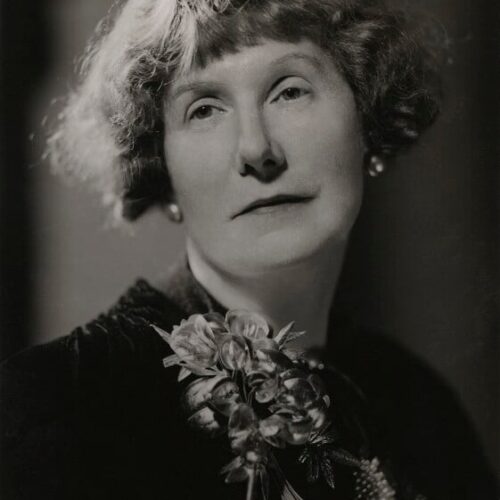

Toast by Marjorie Bowen at the Fortieth Annual Dinner and Reunion of the Rationalist Press Association, at the Trocadero Restaurant, Piccadilly, on Saturday 13 May 1939 (published in The Literary Guide, July 1939).
I have a very deep conviction that the Rationalist Press Association and all other Rationalists have done far more than most of us realize or recognize… The intellectual freedom that we enjoy is the result of the work of a comparatively few brave, honest, and extremely civilized men and women, most of whose names you see on the roll of the R.P.A.
Lord Snell, my Lord, Ladies and Gentlemen,—I have been asked to second the Toast of “Prosperity to the Rationalist Press Association.” I feel extremely honoured by the invitation, and not in any conventional sense of the word. Indeed, you must be assured that I do really sincerely feel this honour, since it has induced me to make myself perhaps ridiculous by attempting to follow so brilliant and experienced a speaker as Lord Ponsonby, and to speak on the subject when he has already touched on almost every point with such delightful wit and such profound and enduring philosophy. It is, however, an act of faith for me to say a few words, however inadequate, for the Rationalist Press Association and all that it means.
I have a very deep conviction that the Rationalist Press Association and all other Rationalists have done far more than most of us realize or recognize. I say “all” advisedly, for I feel that the influence of this Association and of the men and women who have supported it has gone very far beyond its own ranks—further, perhaps, than they themselves realize—and has affected those who have possibly never heard of the R. P. A. The intellectual freedom that we enjoy is the result of the work of a comparatively few brave, honest, and extremely civilized men and women, most of whose names you see on the roll of the R. P. A.
How hard it is for us to realize now the bitter struggle, continuing until within the memory of those who are young to-day, to secure for human beings the right of mental freedom; how impossible to over-value the heroism of those who fought in this struggle!
It is easy—in fact, I feel that it is almost impertinent —to praise in ease and comfort, such as I enjoy, the labours of these pioneers, who not only sacrificed all ease and comfort, but who were often martyrs. How hard it is for us to realize now the bitter struggle, continuing until within the memory of those who are young to-day, to secure for human beings the right of mental freedom; how impossible to over-value the heroism of those who fought in this struggle! Superstition and ignorance have always commanded such vast, almost incalculable, vested interests, for they have been bound up with the very roots of society; they have a hundred subtle disguises, and they often hide behind emotions commonly regarded as sacred.
I was from a child a reader of the history of mankind. I learned from it one appalling lesson. It was this, that down the centuries civilization (using the word in its highest sense) had had to contend with the almost overwhelming forces of greed, ambition, lust, and cruelty, masked under the different names of different theologies, bred of ignorance again, and fed again by superstition. I read of Church after Church, sect after sect, in East and West, persecuting one another; every attempt at progress checked, if not stifled; every poet, artist, man of science shackled, persecuted, often to death. That in the rough was the story of mankind as I read it. That these theologies were often loftily conceived, that these persecutions were inflicted in the names of various gods who were claimed to be gods of love, gave a touch of irony, to my childish mind, to the dreadful tale. It is true that I read of great men within these Churches and sects; but their virtues were independent (as it seemed to me then, and as it seems to me now) of their theologies.
There is so much we do not know, so much about which we must be silent. But this is clear: there is no greater peril to humanity than the man who denies the supremacy of reason, and who works on the hypothesis that he is inspired by God and accountable to none other.
And, in as much as these great men were saints and mystics, so they were dangerous guides and perilous leaders. I am not unaware of the delights of spiritual adventures, nor of the enticements of mysticism, nor of those “immortal longings” common to humanity; there is so much we do not know, so much about which we must be silent. But this is clear: there is no greater peril to humanity than the man who denies the supremacy of reason, and who works on the hypothesis that he is inspired by God and accountable to none other. (Hear, hear.) “I am surprised,” George Whitefield once wrote in effect to John Wesley, “that you should say God has revealed the truth to you. It was to me he spoke, and the truth that he gave was something quite different.” (Laughter.) Here you have in a nutshell and reduced to absurdity the recurrent spectacle of the Church leaders quarrelling over their alleged divine inspirations. That in some degree is the kind of emotional confusion you will always get when men claim to be mouthpieces of some unknown power, to be working by the aid of dreams or visions, the oracle or the supernatural voice. Here is confusion, and often perdition. For another saint, real or false, arises on another side. There is another oracle, another vision, and while these contending saints (all claiming to be some god) clash mankind is trampled underfoot. We speak (and this is a sad reflection) of “the Morning Star,” “the Dawn,” of the Reformation. How grim is the knowledge that the Reformation brought no freedom of thought, but only added excuses for persecution. Who was more sunk in debasing superstition than the Black Cameronian Saint who could ‘‘smell a witch” a mile off?
Not until the end of the eighteenth century, when liberal thought really advanced and dared show its head and men threw over theology altogether and put up ethics and reason in its place, could real progress be hoped for and real freedom enjoyed.
It is an unescapable conclusion produced by the reading of history that not by prayer or fasting, nor by the utterances of half-demented saints, nor by the invocation of man-created gods… but by the exercise of the human mind and the application of reason can our present miseries be healed and our present fears allayed.
It is an unescapable conclusion produced by the reading of history that not by prayer or fasting, nor by the utterances of half-demented saints, nor by the invocation of man-created gods, nor by appeals to spiritual forces at present still mysterious, but by the exercise of the human mind and the application of reason can our present miseries be healed and our present fears allayed.
By putting our problems before the intellect of man we put them before that which has created all the theologies of the world. There is no higher tribunal. If its judgment be not listened to, the martyrdom of man will continue.
In seconding this Toast with great sincerity and humble gratitude, I wish to pay my deep homage to all the men and women who founded, and who now lead and support, the Rationalist Press Association, added to my strong appreciation of their efforts—efforts which in my conviction are towards our only hope of peace and happiness. (Applause.)
The Toast was then honoured.
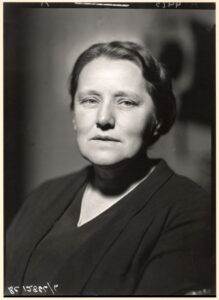
It lies within our power, if we so desire it, to make the familiar world we inhabit more worthy of […]
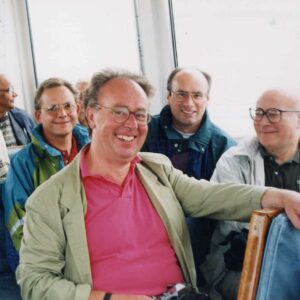
The obituary reproduced below was written by George Broadhead, and originally appeared in a 1997 issue of The Gay Humanist […]
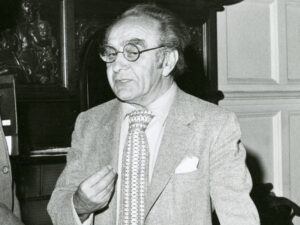
The notion that a man shall judge for himself what he is told, sifting the evidence and weighing the conclusions, […]
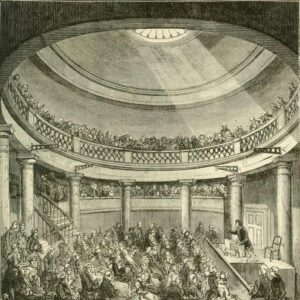
In the absence of a better—the palladium of what liberty we have… the birthplace of mind, and the focus of […]